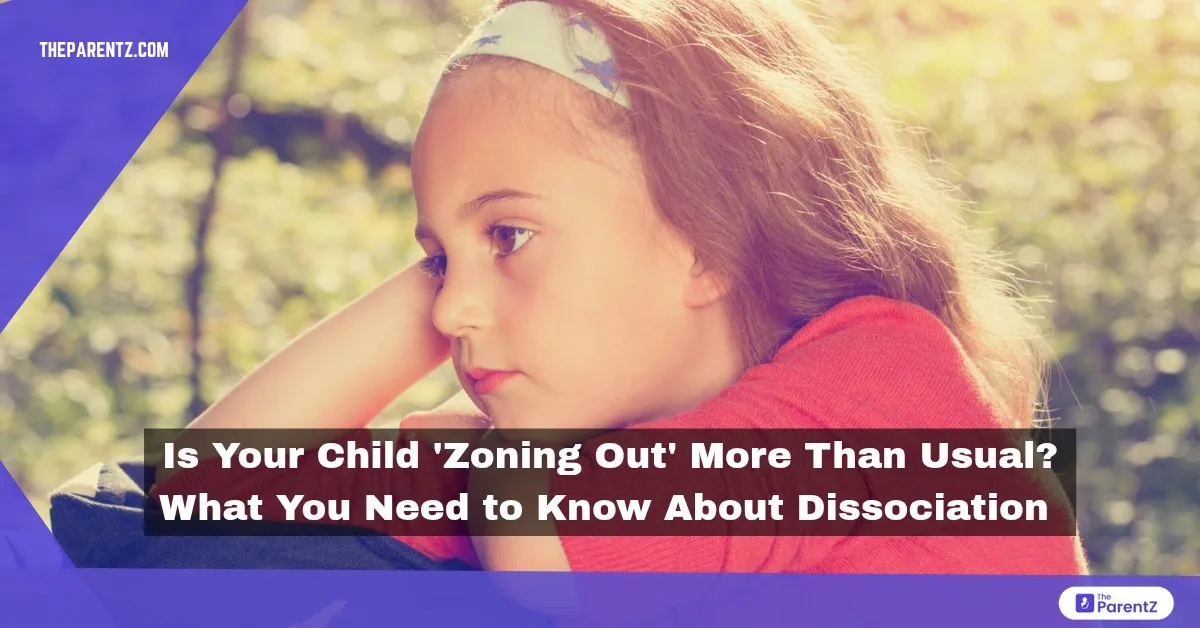As a parent, you're finely attuned to your child's moods and behaviors. You know when they're happy, sad, stressed, or just plain tired. But what happens when you notice them "drifting away" more often than usual? Maybe they're staring blankly into space, struggling to remember simple things, or just seem "not there." It's easy to dismiss it as daydreaming, but sometimes, it could be something called dissociation.
Dissociation is like the mind's way of hitting the "pause" button when things get too overwhelming. Imagine your child is watching a scary movie, and they cover their eyes so they don't have to see it. Dissociation is similar—it's like their mind is trying to protect them from intense feelings, memories, or situations by disconnecting from reality for a bit.
What Is Dissociation?
Dissociation is a mental process where a person disconnects from their thoughts, feelings, surroundings, or even their sense of identity. While it might sound concerning, dissociation is actually a natural survival mechanism that helps protect the mind during overwhelming experiences.
For children, dissociation can look like:
- Staring blankly into space
- Having a glazed look in their eyes
- Seeming "not there" even when physically present
- Being unable to recall periods of time
- Showing sudden changes in behavior or mood without obvious triggers
- Acting younger than their age in certain situations
Why Is This Happening to My Child?
Children don't choose to dissociate. It's an automatic protective response that happens for several reasons:
As Protection from Overwhelming Experiences
When a child faces situations that are too frightening, painful, or overwhelming for their developing brain to process, dissociation provides an escape. It's like the mind's emergency exit when physical escape isn't possible.
In Response to Trauma
Children who have experienced trauma (like abuse, neglect, witnessing violence, or medical trauma) are more likely to dissociate. Their brains learned this coping strategy during dangerous situations, and now it activates automatically when they feel unsafe.
Due to Ongoing Stress
Chronic stress from family conflict, bullying, academic pressure, or major life changes can trigger dissociative responses. Even when the original danger has passed, the pattern remains.
Because of Sensory Sensitivities
Some children with sensory processing differences become overwhelmed by everyday sensory input (loud noises, bright lights, uncomfortable textures), which can trigger dissociation.
What Should I Look For?
It can be tough to know if your child is dissociating, especially since they might not even realize it themselves. But here are some signs that might give you a clue:
- The "Thousand-Yard Stare": Do they often have a blank expression, like they're staring right through you?
- "Where Did My Memory Go?": Are they suddenly forgetful, struggling to remember recent events or things they've said? They may also have no memory of long periods of time in their childhood.
- "This Isn't Real!": Do they ever say things that sound detached from reality, like "This is just a dream" or "I feel like I'm watching a movie"?
- "Who Am I Today?": Do they sometimes act like a different person, with changes in their voice, behavior, or even their beliefs?
- Numbness Inside: Do they seem emotionally distant, like they're not really feeling anything? They may be present and aware of their surroundings but feel completely numb on the inside, emotionally cut off, disconnected, and empty.
- Trouble Focusing: Are they struggling to concentrate or complete tasks that used to be easy for them?
- Denying the Obvious: Do they genuinely deny doing something wrong, even when you know they did it?
- Unpredictable Mood Swings: Do they experience sudden and extreme mood changes without any clear trigger?
How Can I Help My Child?
Seeing your child struggle with dissociation can be heartbreaking, but there are things you can do to help them feel safe and grounded:
- Create a Calm and Safe Home: Make your home a haven where your child feels loved, accepted, and secure. Minimize stress, conflict, and unexpected changes.
- "I'm Here With You": When you notice your child dissociating, gently bring them back to the present. Use a soft, reassuring voice and remind them where they are and that they're safe. Use their name: "Sam, you're at home. It's Monday afternoon. It’s me – mum."
- Connect with Their Senses: Help your child engage with their senses by asking them to describe what they see, hear, smell, taste, and touch. Ask them questions about their surroundings (Can you feel the soft blanket? What colors do you see around you?)".
- A Gentle Touch: If your child is comfortable with it, offer a gentle touch, like holding their hand or putting your arm around them. Use gentle touch, such as placing your hand on their knee or their hand.
- Let Them Express Themselves: Encourage your child to express their feelings through drawing, writing, music, or any other creative outlet.
- Don't Hesitate to Seek Professional Support: A therapist specializing in trauma and dissociation can provide your child with the tools and support they need to heal.
When to Seek Professional Help
While occasional dissociation is normal, especially after stressful events, consider professional support if:
- Dissociation significantly interferes with daily functioning.
- Your child expresses concerning thoughts or feelings.
- Dissociative episodes are increasing in frequency or intensity.
- Your child reports hearing voices or having "parts" of themselves.
- Memory gaps are frequent or extensive.
- Your child experiences significant distress about their experiences.
Mental health professionals with experience in childhood trauma can provide specialized assessment and treatment. Effective approaches might include play therapy, art therapy, cognitive-behavioral therapy, or specialized trauma treatments.
Conclusion
If you're seeing these signs in your child, remember that you're not alone. Dissociation is a common coping mechanism, especially for kids who've experienced trauma. By understanding what's happening and providing a safe, supportive environment, you can help your child heal and thrive.








Be the first one to comment on this story.